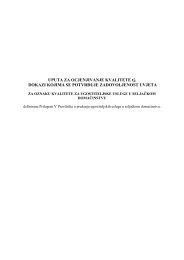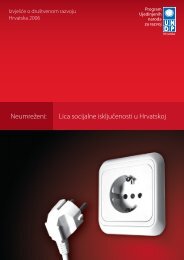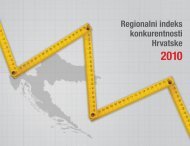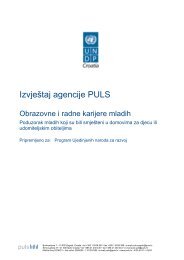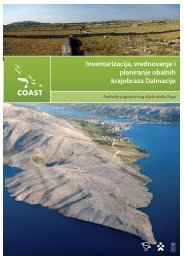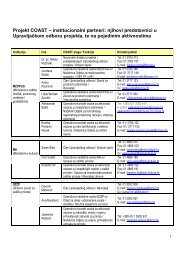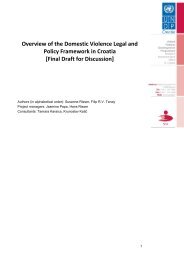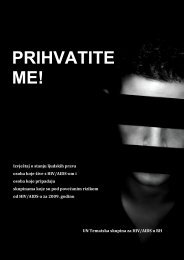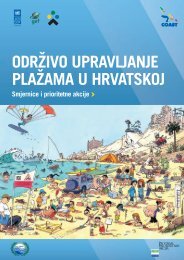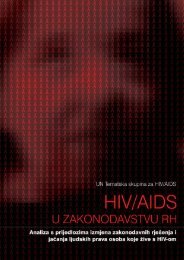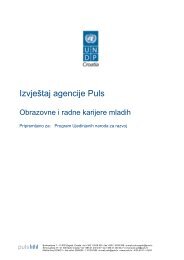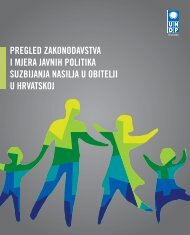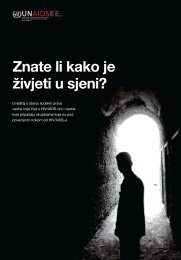WEB engleska verzija end.indd - UNDP Croatia
WEB engleska verzija end.indd - UNDP Croatia
WEB engleska verzija end.indd - UNDP Croatia
- No tags were found...
Create successful ePaper yourself
Turn your PDF publications into a flip-book with our unique Google optimized e-Paper software.
THE SOCIALLY EXCLUDEDCHAPTER 33.12 The HomelessBox 17: Personal storyNada is a well-groomed 60-year old. She has adaughter and two grandchildren. Until a year agoshe lived in her own apartment, but today she is aresident at a shelter for the homeless. She says: “Fiftypercent is my fault, but fifty percent is the fault of thestate where the rule of law does not work.” After herdaughter was married, her apartment became toobig for just one person, so she sold it and invested allof the money in a bank which later went bankrupt.Her daughter lives in a small apartment with herhusband, and Nada does not want to impose onher family. “The young and the old do not mixwell. I cannot sleep in the same room with my twograndchildren.” At the moment, she is waiting for adecision on her disability pension. After she gets it,she will be able to rent an apartment or room andlive as a tenant. She hopes to see the <strong>end</strong> of thecourt proceedings, and to receive compensation forthe lost investment. Nada suffers from a severe formof depression and has to take medication regularly.(Focus group discussion, <strong>UNDP</strong>).This example is typical of a new homelessness intransitional countries where people used to havesecure job all their lives, they had a family and astable residence, but they failed to acclimatizeduring transition, that brought along marketinsecurity, privatisation of housing funds, and theclosure of companies where they had planned towork until retirement.3.12.1 Human RightsUnder the Universal Declaration of Human Rights, theright to housing is considered a basic human right. Inthe Constitution of the Republic of <strong>Croatia</strong>, the rightto housing is not expressly mentioned, but it is notedthat the state must ensure the right to a dignified lifeto all citizens, 142 and particularly to those with disabilities,those who are helpless, unemployed or thosewho are not able to work. 143 Since homelessness in<strong>Croatia</strong> is a relatively new phenomenon, it is yet to beincorporated into the Social Welfare Act, or any otherlegislation, although most homeless people are registeredas permanent beneficiaries of various rightsand forms of assistance in the social welfare system.However many of the benefits available through thewelfare system are based on county residence. For thehomeless who cannot claim residency in any county,gaining access to these services becomes problematicand they become dep<strong>end</strong>ent on humanitarian,religious and non-government organisations.According to the National Action Plans for FightingSocial Exclusion (NAP/incl.) in 10 New Member States ofthe European Union, the term homeless person refersexclusively to people who live “without a roof over theirheads”. This definition is much more restrictive than theNational Action Plans of the 15 old Member States ofthe EU, in which all situations concerning “homelessness”were viewed from a much more general perspectiveand which took into account various degrees ofdeprivation in the realisation of adequate and healthyhousing (European Commission Report on NAPs in 10New Member States of the EU, 2005).The definitions of homelessness and the conceptualframes used to monitor and evaluate it and used toplan social policy measures were developed by a groupof experts from Eurostat and FEANTSA (EuropeanFederation of National Organisations working with theHomeless). The FEANTSA typology of homelessnesstakes into consideration the physical, social and legaldimensions of housing and develops 4 basic deprivationconcepts: rooflessness, houselessness, living in insecurehousing, living in inadequate housing. The firstcategory, rooflessness, covers people who sleep in thestreet and who use homeless shelters. The second category,houselessness, covers those who live in hostelsfor homeless persons, in temporary accommodation,women’s shelters, alien asylum centres, temporary accommodationfacilities for immigrant workers, in prisonsand medical institutions and in all other forms ofsubsidised and interim accommodation. The categoryof living in insecure housing includes people who livewith their ext<strong>end</strong>ed family or fri<strong>end</strong>s on a temporarybasis, who do not have the legal right to the accommodationthat they use, who live in apartments p<strong>end</strong>ingeviction and persons who live under a constant threatof family violence. Living in inadequate housing refersto life in temporary and non-standard structures, such142 ‘The Republic shall protect maternity, children and young people, and shall create social, cultural, educational, material and otherconditions conducive to the realization of the right to a decent life’, Constitution of the Republic of <strong>Croatia</strong>, Article 62.143 The Constitution of the Republic of <strong>Croatia</strong>, Article 57.105



